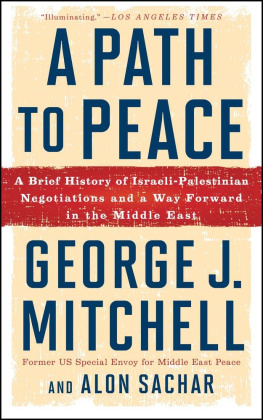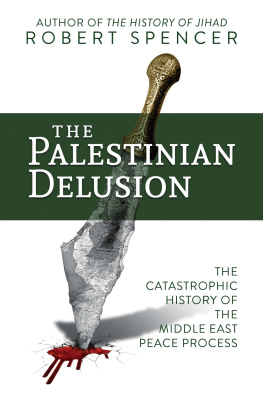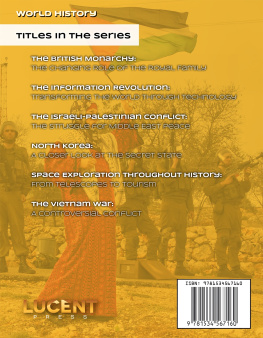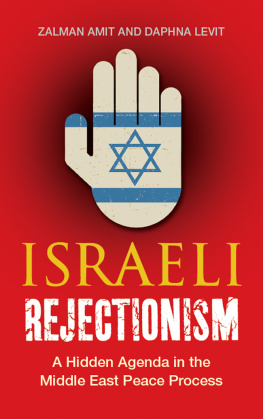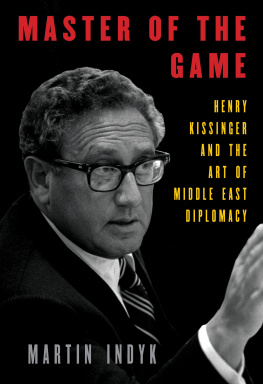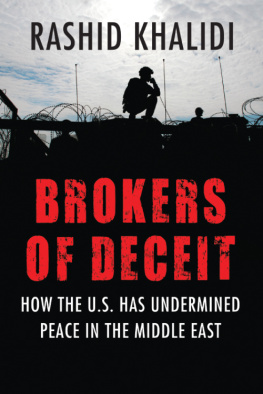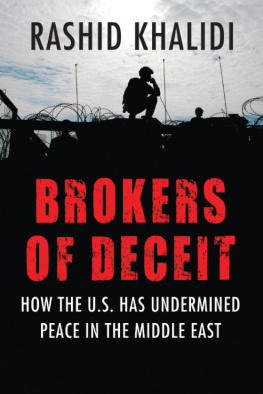Thank you for downloading this Simon & Schuster eBook.
Join our mailing list and get updates on new releases, deals, bonus content and other great books from Simon & Schuster.
C LICK H ERE T O S IGN U P
or visit us online to sign up at
eBookNews.SimonandSchuster.com
ALSO BY GEORGE J. MITCHELL
The Negotiator: A Memoir
Making Peace
Not for America Alone: The Triumph of Democracy and the Fall of Communism
World on Fire: Saving an Endangered Earth
Men of Zeal: A Candid Inside Story of the Iran-Contra Hearings
(with Senator William S. Cohen)

Simon & Schuster
1230 Avenue of the Americas
New York, NY 10020
www.SimonandSchuster.com
Copyright 2016 by George Mitchell and Alon Sachar
All rights reserved, including the right to reproduce this book or portions thereof in any form whatsoever. For information address Simon & Schuster Subsidiary Rights Department, 1230 Avenue of the Americas, New York, NY 10020.
First Simon & Schuster hardcover edition November 2016
SIMON & SCHUSTER and colophon are registered trademarks of Simon & Schuster, Inc.
For information about special discounts for bulk purchases, please contact Simon & Schuster Special Sales at 1-866-506-1949 or .
The Simon & Schuster Speakers Bureau can bring authors to your live event. For more information or to book an event contact the Simon & Schuster Speakers Bureau at 1-866-248-3049 or visit our website at www.simonspeakers.com.
The opinion and characterizations in this piece are those of the authors and do not necessarily represent official positions of the United States government.
Interior design by Ruth Lee-Mui
Interior maps by Barak Paz
Jacket design by Tom Mckeveny
Library of Congress Cataloging-in-Publication Data
Names: Mitchell, George J. (George John), 1933- author. | Sachar, Alon, author
Title: A path to peace : a brief history of Israeli-Palestinian negotiations and a way forward in the Middle East / George J. Mitchell, Alon Sachar.
Description: New York : Simon & Schuster, 2016. |
Includes bibliographical references and index.
Identifiers: LCCN 2016027278 (print) | LCCN 2016040659 (ebook) | ISBN 9781501153914 (hardcover : alk. paper) | ISBN 9781501153938 (Ebook)
Subjects: LCSH: Arab-Israeli conflict--Peace. | Palestinian Arabs--Politics and government.
Classification: LCC DS119.7 .M585 2016 (print) | LCC DS119.7 (ebook) | DDC 956.9405/4--dc23
LC record available at https://lccn.loc.gov/2016027278
ISBN 978-1-5011-5391-4
ISBN 978-1-5011-5393-8 (ebook)
CONTENTS
ACKNOWLEDGMENTS
T he writing of a book is ordinarily a lonely pursuit. This book was not, because I was assisted by Alon Sachar. Alon now practices law in San Francisco, but from 2006 to 2012 he worked in the Near Eastern Affairs Bureau of the U.S. Department of State. From January 2009 to May 2011 I served as the U.S. special envoy for Middle East, and Alon was a valued member of my small staff. He has an encyclopedic knowledge of the Middle East, in particular the recent history of Israel and the Palestinians.
The laws of Israel regarding land use are as complex as they are consequential. Among other things, I relied on Alon to penetrate and explain them to me. I knew I had made the right choice when, at one of the many meetings we held with Israeli officials, they asked Alon to confirm their understanding of their own bureaucracy and laws.
I also relied on the knowledge and judgment of other members of my talented staff: David Hale, now the U.S. ambassador to Pakistan, previously ambassador to Jordan and Lebanon, served as my deputy and later succeeded me as envoy; Fred Hof, a retired army officer, is a widely respected expert on Israel-Syria issues; Mara Rudman, was also a deputy envoy and my chief of staff and later served as the Assistant Administrator for the Middle East at the Agency for International Development; and Payton Knopf, a career foreign service officer at the time whose understanding of the issues and of the mechanics of diplomacy and whose communication skills are first-rate. While I served as envoy, Jeff Feltman headed the Near Eastern Affairs Bureau; he had previously served in Jerusalem and as ambassador to Lebanon and is now the United Nations Undersecretary General for Political Affairs. Although he was not a member of my staff, I regularly benefited from his wise advice and counsel. Dan Shapiro, now the U.S. ambassador to Israel, and Prem Kumar were then on the staff of the National Security Council at the White House; they were extremely knowledgeable and helpful. Although only Alon worked with me on this book and the views expressed herein are ours alone, the combined knowledge of these colleagues made this book possible. What I learned from them continues to inform my views, and I thank each of them and all of the other members of my staff.
I am indebted to Jonathan Karp and his outstanding team at Simon & Schuster. Megan Hogan edited this book with skill and tact. Thanks also to Maureen Cole, Cary Goldstein, Stephen Bedford, Richard Rhorer, Lisa Healy, Ruth Lee-Mui, Jackie Seow, Lisa Erwin, Kristen Lemire, and Allison Har-Zvi.
Finally, I thank my familymy wife, Heather; our children, Andrew and Claire; and my daughter, Andrea, and her son, Ianfor their continued love and support.
When two people combine to write, readers may occasionally be uncertain about whose words they are reading. To be clear, we signals our joint writing; I signals that the words are mine.
George J. Mitchell
Mount Desert Island, Maine
July 2016
I knew little about George Mitchell when President Obama appointed him as his Special Envoy for Middle East Peace. I was too young to appreciate the significance of the Good Friday Agreement he negotiated in Northern Ireland in the 1990s; or the fifteen years he served as U.S. senator, including six as majority leader; or of the myriad other high-profile matters he had worked on since leaving the Senate, including efforts to rid Major League Baseball of steroids to overcoming the stain of corruption from the Olympic games. He has led a major international law firm and served on the board of several Fortune 500 companies. All this from a man who put himself through college and law school and grew up in the most humble of circumstances: his father was a janitor and his mother, an immigrant to the U.S. at the age of eighteen, worked in textile mills.
There are those who call Mitchell the judge, alluding to his former stint as a federal judge, his infamous poker face, and his regular deployment of the Socratic method on issues big and small. With a lifetime (or, rather, several lifetimes) of accomplishment, he is most proud of his service to the people of Maine, the reason I and so many others continue to call him Senator.
This is who Senator Mitchell was when he was appointed Special Envoy. Unlike so many others in the policy world, he did not seek out a high-level appointment to make a name for himself. That he had many times over. Indeed, with a wife and two young children at home, as well as a comfortable private-sector career, his appointment came at a high personal cost. But Senator Mitchell is a life-long public servant, ultimately and entirely dedicated to the American people. He accepted a direct request from the president and secretary of state because he felt it was his duty to say yes despite the cost. Yes to a job that no one before him had succeeded in, yes to a push that would expose him to a great deal of criticism, and yes to likely failure. It has been the single greatest honor of my life thus far to work for and be mentored by Senator Mitchell.
Next page

